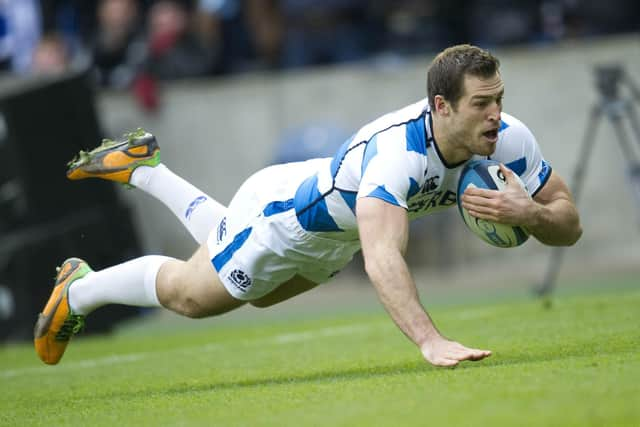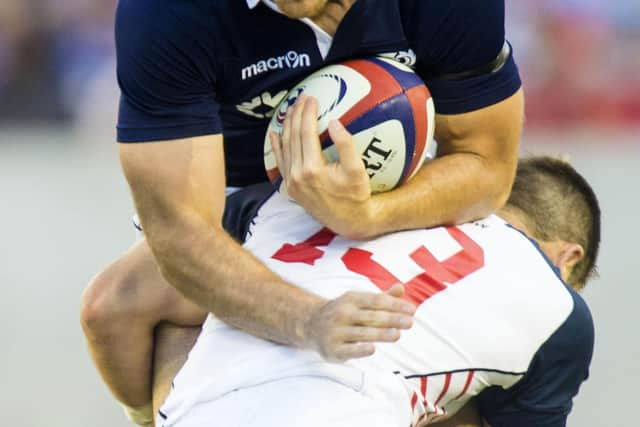Tim Visser, Scotland's flying Dutchman: 'You guys are so polite it's crazy. I'm more blunt'


This was Fran ten Bos and what a funny but frank and oh so formidable character he was. “Is that what your newspaper gives you for a car?” he said as I pitched up in the modest jalopy. Then when I produced my voice recorder: “Shorthand not up to this, eh?” Finally when I bid goodbye: “Where’s your business card, man?”
Thankfully Visser, the flying winger moving slower in retirement, is a big softie in comparison, although, as he laughs when I tell him about the brusqueness of the old lock forward from the early 1960s, there’s full acknowledgement of the character trait of the country of their birth.
Advertisement
Hide AdAdvertisement
Hide Ad“We Dutch don’t mess about, do we?” he says. “We’re 100 per cent plain-spoken. We say what we think and we can be blunt. You guys on the other hand are so polite it’s crazy and you love to queue. Honestly, your small talk before you finally get around to saying what you mean. It would be: ‘Excuse me, sir, I was possibly, maybe, potentially ahead of you in this line – would it be too much to ask, would you mind terribly if you were to perhaps reconsider your position?’ In Holland it would be: ‘Get right to the back, mate!’”


We’re in Edinburgh at Holy Corner where Brunstfield meets Morningside, in a bistro which used to be a bank. Visser, now a property developer, would love to have had the chance to turn the building into apartments but approves of this conversion. What about the four places of worship which have given the junction its name? “Well, hardly anyone goes to church anymore but they’re tricky. They’re listed and features have to be preserved so there’s lots of dead space which can’t be used.”
No matter, his books are busy. The ill wind of Covid has blown him failed bars and restaurants which he’s transforming into residential. He says developers of his type are occasionally “vilified” but Edinburgh has a housing shortage and renovating the sometimes dilapidated sites he goes after would be beyond most individuals.
Visser likes his new life but it’s not rugby. Even so, while he misses the camaraderie of the game, like all retired players, he doesn’t pine for the blood and thunder of games. “I watch rugby now – the hits, the brutality – and wonder: ‘How did I ever do that?’ When you’re playing you have the cool mindset of giving your all and not thinking about the consequences, the dangers for a winger of those aerial collisions, putting your body on the line. But then you stop, the mindset goes, and you say to yourself: ‘That looks dangerous. I’m glad I’ll never have to do it again.’”
At 35 he still gives the impression he could. That strapping 6ft 5ins physique meant he won more than his fair share of steepling punts on the way to being capped 33 times, and for his adopted country the speedster ran in 14 tries. His opponents on the flanks couldn’t always catch him but top fashion labels got him to stand still long enough to model their clothes. “Easy money,” he says with that complete absence of coyness.


Many of the tries were memorable: a field-length gallop in the Stade de France; the alertness, also against France, to clutch a surprise flick-on by Stuart Hogg and plunge for the line; that brace against the best team on the planet.
Team players are sometimes only told the night before a big game that they’ve made the cut, often to minimise the amount of time left to be nervous; not so Visser against New Zealand ten years ago yesterday.
Handed his debut by Andy Robinson five months previously on a summer tour against Fiji – when he also scored two tries – the head coach informed him many weeks in advance that he would be facing Dan Carter, Richie McCaw et al. “That was crazy,” he says, “and being relatively inexperienced as an international it kind of scared me. I guess Andy was trying to instil confidence but I ended up having these strange dreams where I was facing down the All Blacks during the Haka only I’d forgotten my shorts!”
Advertisement
Hide AdAdvertisement
Hide AdAnxious he might have been about the identity of the opponents for his first game at Murrayfield in the dark blue, but Visser was unfailingly confident in his abilities and today a typical remark is: “As a winger I could always see a situation develop … a long pass over the top and I’d be away.” Similarly: “If you gave me space one-on-one then nine times out of ten I would finish.” And of where he was in November 2012: “Everything I was doing with Edinburgh was turning to gold and Scotland at the time had been struggling to score tries.” But this is not him boasting; he’s simply being Dutch.


Not so phlegmatic on the day, though, that he wasn’t thrilled to cross the line, the first of his tries putting Scotland ahead. “Matt Scott won an interception and I knew he wasn’t quite quick enough so I caught up with him. I dived over, tried to get back up but fell back down because I was so excited. I’ve been asked: ‘Did you hear the crowd when the stadium was full?’ Really you don’t during the course of a game because you’re so clued in to what you’re doing. But when you score the roar is unbelievable. Just huge joy.”
Visser’s family had all come over from Holland for the match and what was the first thing dad Marc and little brother Sep said to him after the final whistle? “They called me a traitor! That was a joke, they understood it was an easy choice [switching to Scotland]. Both of them played rugby for Holland and I thought I would do that, too. But coming here, making the international team, playing in the Six Nations and the World Cup – all of that did more for rugby’s profile back home than if I’d stayed in the game in the Netherlands. At that time Holland were lower in the ranking than Kazakhstan.”
Visser, who qualified to wear the thistle on residency grounds, grew up in the village of Maartensdijk in Utrecht province. His entrepreneurial flair developed at a young age – money-making schemes included buying and selling phones at school and collecting golf balls at driving ranges – as did his sporting prowess. “If you don’t play a sport in Holland people think there’s something wrong with you,” he says. Rugby is nowhere near the biggest in his homeland but, representing Holland at under-18 level, he was scouted by Newcastle Falcons.
Pitching up in England’s north-east at 16 he was naive about rugby amounting to a career. “One day I was watching Jonny Wilkinson practice his kicking. He was out there for ages. I said to someone: ‘When does he leave for work?’” Visser met his future wife Laura at Barnard Castle School where he was known as “the weird Dutch guy”.
Cultural difference caused the occasional problem. “In Holland I could call my teachers by their first names so it was ‘Morning, Hank.’ But that wasn’t the done thing and neither was saying ‘Shit!’. My dorm got caught with alcohol, which surprised me, because back home at that time you could drink at 16. I wasn’t happy about having to face the wall waiting for the headmaster.”
In rugby, too, the weird Dutch guy wouldn’t always stand on ceremony. He moved from Edinburgh – where he raced in 60 tries, still a club record – to Harlequins and chuckles at the memory of a team meeting to address a dismal run of form. “I think it was [England international] Mike Brown who said we were terrible, embarrassing, a joke. I said: ‘Hang on, mate, you’ve been f****n’ shit yourself!’”
For his stint at Quins Visser lived in Surrey. He uses the same expletive to describe the locale and resolved with Laura, who’s English, to return to the Scottish capital as quickly as possible. Although the couple have since split up, they continue to share the parenting of their two young sons on the city’s south side. He also has a house in Holland and returns every summer to catch up with family, mess about on his boat and waterski.
Advertisement
Hide AdAdvertisement
Hide AdHe’s lived longer in Scotland than Holland now and muses on how this has shaped his personality. “I say what I mean and don’t talk round things. That can get you into a bit of bother but I’m brutally honest, not least with myself, and I think anyone who knows me and has stuck around loves me for that.
There’s a saying in Holland: ‘Just act normal because when you do you’re crazy enough.’ I actually think that Scots are not too dissimilar to the Dutch in terms of the self-deprecation. But I’d like to think I’ve acquired some of your characteristics. Become a bit more subtle.”
Visser’s game against New Zealand captured Dutch imaginations. “It was really special. Rugby in Holland isn’t very big but everyone at home knows about the All Blacks so it was huge news that I’d been selected for the match. I was the first and only professional player from Holland, the first to be picked for a top-flight side, the first to compete against the best team in the world. I still get all that even now.”
Scotland have never beaten New Zealand. Maybe the All Blacks have lost the aura of invincibility but, warns Visser as he prepares to cheer us on tomorrow, the side Gregor Townsend’s men face at Murrayfield will be a “wounded animal”. He adds: “It’s a cheesy thing to say that the likes of Ireland and Argentina have forced open the door [exposing New Zealand vulnerability]. I watched them last week when they absolutely trashed Wales.”
In 2012 after the first of Visser’s tries had given the Scots the lead the All Blacks hit back with six of their own to win 51-22 for their equal biggest points haul in Edinburgh. Nothing, though, can dull the memory of the match or the occasion for the romping giant of the flanks.
He smiles while remembering the initiation ceremony of learning “Flower of Scotland”. “On that summer tour, on the bus to every training session or match, Richie Gray would stand up and shout: ‘Newbies! Anthem check!’ The first few times I tried to sing it I kept starting off with ‘The’ instead of ‘Oh’. That got me booed and I’d have to sit back down and try again next trip. Then when I was doing okay learning the verses, reciting them quietly to myself, that bugger Geoff Cross would slip in wrong words to put me off.
“I was fine by the time the game came round. The issue then was trying to stop myself getting too emotional. First there were the pipers playing us into the stadium. And then there were all these folk in Dutch shirts with my name on the back waving orange flags - hundreds of them. Coming from my land, coming to yours, about to step onto the park as a Scottish rugby internationalist - it was really special.”
Tim Visser is an ambassador for Wooden Spoon, the children’s charity of rugby (woodenspoon.ork.uk).
Comments
Want to join the conversation? Please or to comment on this article.